Brazil profile - Timeline
- Published
A chronology of key events:
1500 - Portuguese land in the area and claim it for the Portuguese crown.
1822 - Son of Portuguese king declares independence from Portugal and crowns himself Peter I, Emperor of Brazil.
1888 - Slavery abolished. Large influx of European immigrants over the next decade.
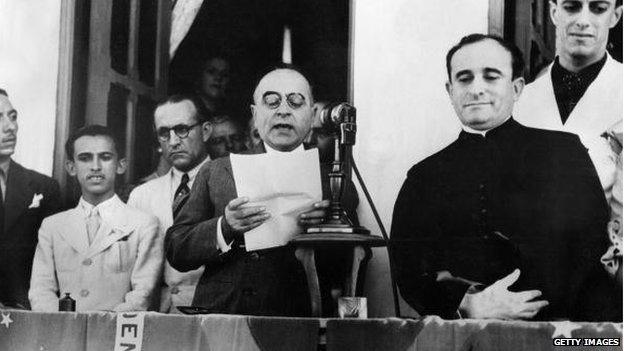
Getulio Vargas gained power in a coup, ruled as a dictator and was himself ousted in a coup
1889 - Monarchy overthrown, federal republic established with central government controlled by coffee interests. Brazil produces 65% of world's coffee by 1902.
Vargas period
1930 - Revolt places Getulio Vargas at head of provisional revolutionary government.
1937 - President Vargas leads coup, rules as dictator with military backing. Economy placed under state control, start of social welfare revolution.
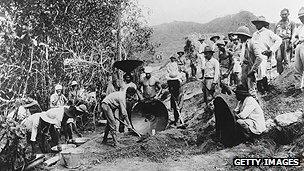
Workers pan for gold in the 1930s. The mineral was important to the country's development
1939-45 - Brazil initially declares itself neutral but in 1943 joins Allies in World War II.
1945 - President Vargas ousted in military coup. New constitution returns power to states.
1951 - Getulio Vargas re-elected president, but faces stiff opposition.
1954 - President Vargas commits suicide after military gives him the options of resigning or being overthrown.
1956-61 - President Juscelino Kubitschek achieves rapid economic growth.
1960 - President Kubitschek moves capital to Brasilia.
1960 - Janio Quadros elected president, but resigns after several months, plunging country into constitutional crisis. Succeeded by left-wing vice-president, Joao Goulart.
Military rule
1964 - President Goulart ousted in bloodless coup, flees into exile. Military rule associated with repression but also with rapid economic growth based on state-ownership of key sectors.
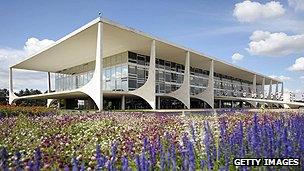
The presidential palace in Brasilia, which became the capital in 1960
1974 - General Ernesto Geisel becomes president, introduces reforms which allow limited political activity and elections.
1985 - Tancredo Neves chosen as first civilian president in 21 years under military-run electoral college, but dies before he can be inaugurated.
His vice-president Jose Sarney becomes president, and struggles to cope with inflation.
1988 - New constitution reduces presidential powers.
Economic woes
1989 - Fernando Collor de Mello becomes first directly-elected president since 1960. Introduces radical economic reform, but improvements fail to materialise, and inflation remains out of control.
Foreign debt payments are suspended.
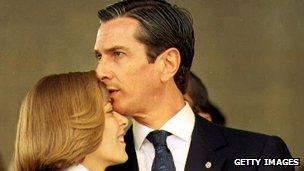
President Fernando Collor de Mello
1992 - President Collor resigns after being accused of corruption, of which he is later cleared. Replaced by vice-president Itamar Franco.
1994 - Fernando Henrique Cardoso elected president after helping to bring inflation under control as finance minister. He distributes land among the poor, but causes controversy over allowing indigenous land claims to be challenged.
1997 - Constitution changed to allow president to run for re-election.
1998 - President Cardoso re-elected. IMF provides rescue package after economy hit by collapse of Asian stock markets.
Lula elected
2002 October - Luiz Inacio Lula da Silva, popularly known as Lula, wins presidential elections to head first left-wing government for more than 40 years.
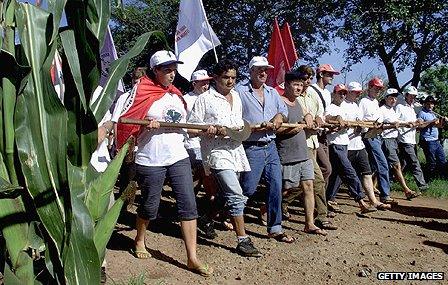
The landless movement has staged protests and land invasions
2003 August - Space rocket explodes on the ground at the Alcantara launch base, killing 21 people.
2004 April - Wave of land invasions, dubbed "Red April" by landless campaigners.
2004 October - Brazil launches its first space rocket.
2005 February - Murder of US-born missionary and campaigner for Amazon peasant farmers Dorothy Stang throws conflict over land and resources in Amazon into spotlight. Government unveils plan to protect part of region from encroachment.
2005 June-August - Corruption allegations rock the governing Workers' Party. A wave of resignations ensues.
2005 October - Voters in a referendum reject a proposal to ban the sale of firearms.
2006 October - President Lula is re-elected.
2008 May - Environment minister Marina Silva resigns, after conflicts with the government over Amazon development.
2008 July - A congressional commission rejects a bid to legalise abortion in the world's most populous Catholic nation.
2008 August - Government launches scheme offering cash payments and immunity for illegal weapons, in an effort to get 300,000 guns off the streets.
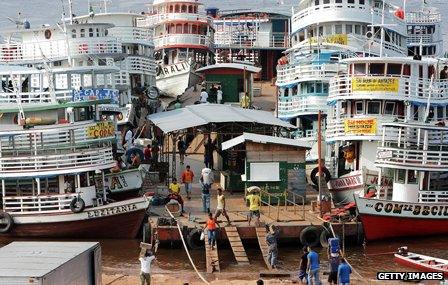
River ferries are a major feature of Brazilian transport
2009 July - Brazil and Paraguay reach a deal to end their long-running dispute over the cost of energy from the giant Itaipu hydro-electric plant on their border.
2009 October - The government says it is to set up a truth commission to investigate abuses committed during military rule in Brazil from 1964 to 1985.
2010 August - Brazil gives formal approval for construction of controversial hydroelectric dam in the Amazon rainforest, expected to be the world's third largest.
First woman president
2010 October - Dilma Rousseff, of President Lula's Workers' Party, wins second round run-off to become Brazil's first female president.
2011 January - Opening of road connecting Brazil's Atlantic coast with Peru's Pacific seaboard.
2011 May - Chamber of Deputies votes to ease restrictions on the amount of land farmers must preserve as forest, raising fears of further deforestation in the Amazon.
2011 June - Government launches Brasil Sem Miseria (Brazil Without Poverty) welfare scheme, aimed at lifting millions out of extreme poverty.
2012 August - Parliament approves affirmative action law for universities that requires them to reserve 50% of their places for state school students, and increases the number of spaces allotted to black, mixed-race and indigenous students.
2012 October - Brazil enacts controversial law meant to protect forests and force farmers to replant trees on scattered swathes of illegally cleared land. Aspects of the law are criticised by both the farm lobby and environmentalists.
Civil unrest
2013 June - A wave of protests sweeps the country. People take to the streets in dozens of cities to demonstrate over poor public services, rising public transport costs and expense of staging the 2014 World Cup. The protests continue into the autumn.
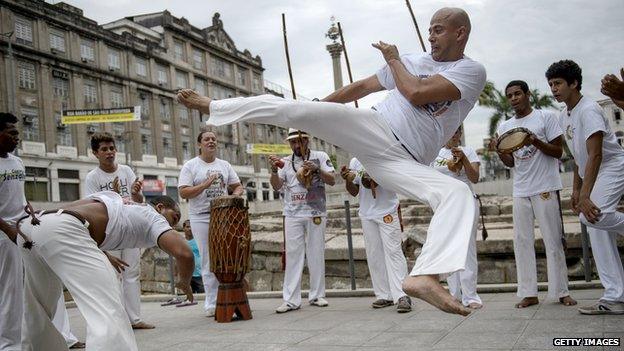
Players of Brazilian Capoeira, a mixture of dance and martial art inherited from the times of slavery, perform to celebrate the nomination of Capoeira to the list of UNESCO's Intangible Cultural Heritage in 2014
2013 October - The rights to explore Brazil's biggest oilfield are awarded to a consortium led by the state-run energy giant Petrobas backed by French, Anglo-Dutch and Chinese firms.
President under pressure
2014 October - Dilma Rousseff wins another term as president.
2015 March - Petrobras state oil company implicated in massive corruption scandal that brings hundreds of thousands onto the streets in protest at President Rousseff, who was company chairperson during the period in question.
2016 February - World Health Organisation declares a global public health emergency following an outbreak of the Zika virus centred on Brazil.
2016 August - Olympic Games are held in Rio de Janeiro.
Senators vote to remove President Dilma Rousseff from office for illegally using money from state banks to bankroll public spending. Michel Temer is sworn in to serve the rest of her term to 1 January 2019.
2016 November - Violent anti-austerity protests take place outside the Brazilian Congress.
2016 December - Senate approves 20-year government spending freeze billed as the centrepiece of the government austerity reforms aimed at restoring economic health to Brazil.
2018 April - Former president Lula da Silva is imprisoned for corruption, which makes him ineligible to run for president in October.
2018 October - Far-right candidate Jair Bolsonaro wins presidential election over Workers' Party candidate, takes office in January 2019.
2020 March - President Bolsonaro causes controversy by refusing to support measures to halt the spread of the Covid-19 virus.